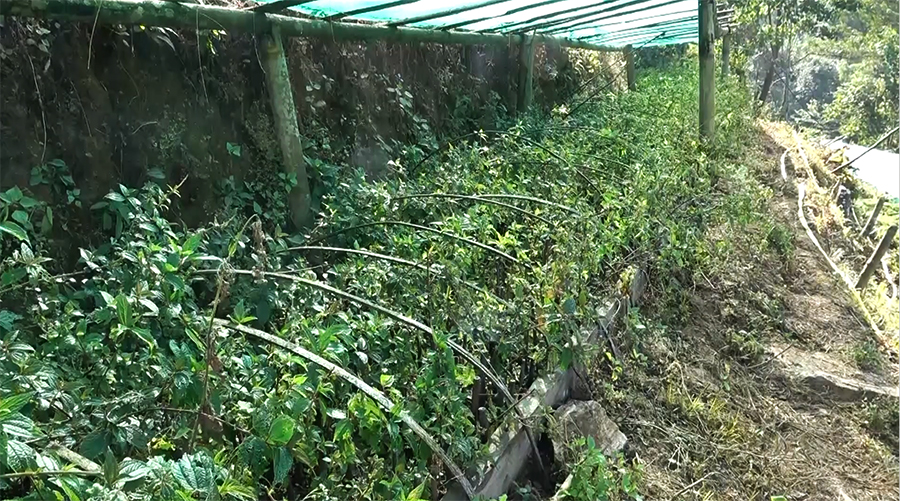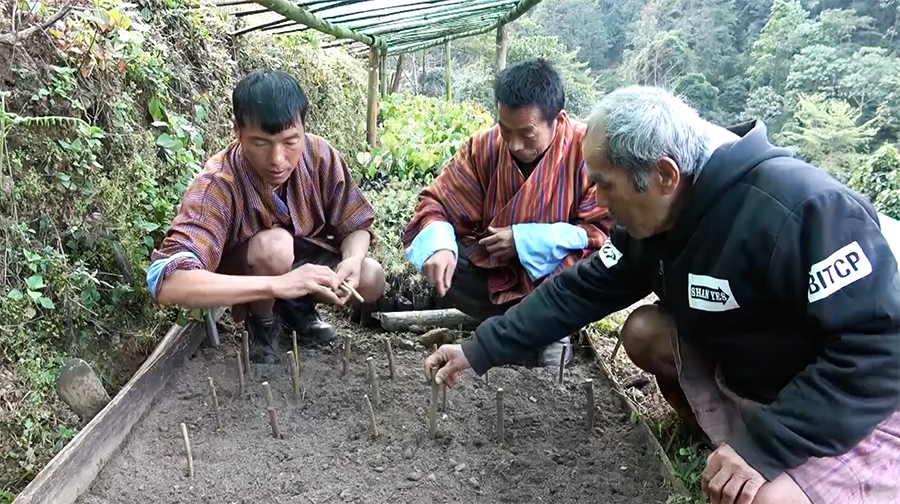 A pilot project to cultivate Pouzolzia sanguinea, a valuable non-wood forest product, has proven successful in Pema Gatshel’s Tokari village. This initiative aims to ensure the sustainability of Pouzolzia, which is heavily harvested for commercial purposes and faces potential decline. The pilot project was started last year.
A pilot project to cultivate Pouzolzia sanguinea, a valuable non-wood forest product, has proven successful in Pema Gatshel’s Tokari village. This initiative aims to ensure the sustainability of Pouzolzia, which is heavily harvested for commercial purposes and faces potential decline. The pilot project was started last year.
 Sonam Jamtsho, a member of the Tokari Pouzolzia Sanguinea nursery group, is looking for Pouzolzia plants in the forest. The plant is locally known as Yongjiba.
Sonam Jamtsho, a member of the Tokari Pouzolzia Sanguinea nursery group, is looking for Pouzolzia plants in the forest. The plant is locally known as Yongjiba.
After searching for one, he then cuts the stems into sections for sapling production.
The group prepares beds by clearing weeds and utilising topsoil collected from the forest.
 They have around 4,000 saplings in their nursery. They will be planting them in the forest and also sell to interested buyers.
They have around 4,000 saplings in their nursery. They will be planting them in the forest and also sell to interested buyers.
Sonam Jamtsho said “We never imagined that Pouzolzia could be grown from cuttings like this. We have mostly been collecting the product without replanting. Now, with the plan to produce saplings, we have formed this group to cultivate and promote its growth.”
Jangchub Dorji, a resident said “We learned about the benefits of raising this nursery. We now understand that it will help sustain the plant’s growth and boost our business.”
The district Chief Forestry Officer told BBS that non-wood forest product groups are among the largest farming groups in Pema Gatshel relying on these resources for their livelihoods. There are 19 Non-Wood Forest Product collection groups in the district.
He said Pouzolzia and Rubbia are the plants most frequently harvested, placing them at risk of depletion.
Pouzolzia is usually used in incense production.
Tshering Dendup, Chief Forestry Officer said “This initiative will help replenish resources that are extracted. This way, future generations can also benefit from these resources, which local communities depend on for their daily lives.”
In addition to Pouzolzia, the group members will also cultivate high-value tree saplings in their nursery.
This will help them earn more while ensuring sustainability.
The Chief Forestry Officer said “We will also provide saplings to other non-wood forest product groups so that we would replenish and the stock.”
 The Forest Division plans to initiate the domestication of Rubbia and other non-wood forest products through nurseries to enhance production and prevent species depletion.
The Forest Division plans to initiate the domestication of Rubbia and other non-wood forest products through nurseries to enhance production and prevent species depletion.
The project is funded by the Asian Forest Cooperation Organization spending Nu 570,000.
Thinley Dorji, Pema Gatshel
Edited by Tshering Zam










